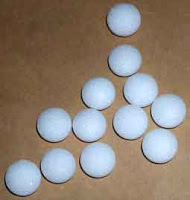I remember walking into my great-grandmother's house when I was a
little girl and there was...well....there was a smell. Unfortunately for
me, it wasn't homemade cookies baking in the oven. I never knew exactly
what it was at the time, but years later I discovered that the smell
was mothballs. Since the smell of mothballs permeated throughout my
great-grandmother's house, she was not using them in a proper manner. I
think many people may not know exactly how to use mothballs properly,
hence my writing this particular blog post.
First
off, please understand that mothballs are a PESTICIDE and can be
harmful if not used according to label instructions. Mothballs contain
napthalene (I made napthalene in a college chemistry class as one of our
laboratory experiments) or paradichlorobenzene as the active
ingredient. Both products are fumigants, or volatile chemicals that
vaporize at lower temperatures (i.e. room temperature). While
"mothballs" is a common term that most are familiar with, these
fumigants may also come in the form of cakes, crystals, tablets, bars,
among others.
To use the products properly, they should be used in
an AIRTIGHT space, such as a well-sealed container, garment bag, etc.
They should not be placed in an open container, in a closet or attic, or
sprinkled willy-nilly throughout the home (hello great-grandma!). As
with all pesticides, you should read and follow all label instructions.
All pesticides, including mothballs, should be kept out of reach of
children and pets (mothballs can be mistaken for candy, so this is
really important).
Friday, March 18, 2016
Mothballs
Labels:
mothballs,
napthalene,
paradicholorbenzene,
repellent
Subscribe to:
Post Comments (Atom)





1 comment:
haha i loved this post most of all the part about the boy at the bottom it was aorible and informative about the moth balls
Post a Comment